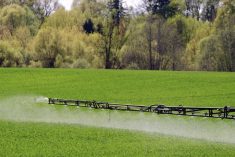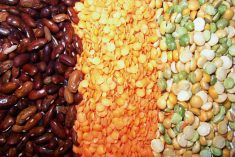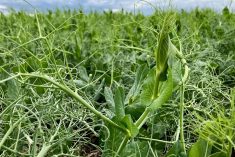CNS Canada — Despite positive developments between Canada and India in regards to pulse crops, the CEO of Pulse Canada is warning producers not to rely on India as market for pulses.
“India is not the market that it was eight months ago and it emphasizes the need to find alternate markets,” Gordon Bacon said.
“If we just keep pushing the same production into the markets that were already there, all we’re going to do is lower the price on a global basis, not just in India.”
Read Also

Alberta crop conditions improve: report
Varied precipitation and warm temperatures were generally beneficial for crop development across Alberta during the week ended July 8, according to the latest provincial crop report released July 11.
Bacon was in India during Prime Minister Justin Trudeau’s visit Feb. 18-24 and for the India Pulses and Grains Association’s Pulse Conclave, attended by representatives from pulse-producing countries and held Feb. 14-16.
Over the last few months the Indian government has been placing tariffs on pulse imports. First, India placed a 50 per cent tariff on pea imports, then a 30 per cent tariff on chickpeas and lentils. The chickpea tariff was later raised to 40 per cent and then on March 1 it was raised to 60 per cent for desi chickpeas.
The latest chickpea tariff increase didn’t affect Canada much, as Canada mostly grows kabuli chickpeas.
The tariffs, Bacon said, “affect all of us as exporting nations. So that was really where some of the discussion in Canada got a little too narrowly focused because it wasn’t about Canada.”
India has applied the tariffs to support its farmers. However reports out of India have said domestic pulse prices have been falling below the government’s minimum support price.
“Nothing’s going to change in India until domestic prices start to rise and until consumers are the ones out on the street protesting the high prices for pulses,” Bacon said.
Trudeau’s visit did help the Canadian pulse industry, according to Bacon. For months the pulse industry has been pushing for federal government intervention over the pulse trade issues with India.
“Unlike Canada what goes on in food prices and agriculture is of an enormous economic and political importance in India,” Bacon said.
For years the Canadian pulse industry has been receiving pulse fumigation exemptions. The Indian government requires pulses shipped to the country to be fumigated before arrival. However, the fumigation process doesn’t work well in cold weather and Canada doesn’t have the nematode pest India is trying to keep out.
Trudeau and Indian Prime Minister Narendra Modi discussed pulses during their meeting in India. A joint release stated the two sides would work together on an agreement over fumigation and for more transparency and predictability in regards to market access.
“We didn’t come home with anything changed (immediately)… but we did come home with a timeline on the fumigation issue and opened the door for some discussion on the food security, transparency and predictability issues,” Bacon said.
There have been other recent developments which have been positive for the Canadian pulse industry. Those include increased demand for peas from China and the pet food industry, and the announcement that Protein Industries Canada, a Prairie-based plant protein research and development organization, had received federal funding.
“It’s not any one area. It’s a whole range of things. And I think this is really where the industry has to create additional demand to replace the uncertainty that India now represents,” Bacon said.
— Ashley Robinson writes for Commodity News Service Canada, a Glacier FarmMedia company specializing in grain and commodity market reporting.



















